| IndustriALL Headlines are produced by IndustriALL Global Union |
IndustriAll Tribute to Nelson Mandela 1918-2013 – At the state memorial service for Nelson Mandela it seemed like even the heavens were in mourning. A grey sombre day, with a steady stream of wet tears from the sky blurring the cameras as one dignitary after another from around the world paid tribute to this great man. Never before has the loss of a leader been mourned the world over, and probably never again.
International Labour Movement Campaigns for Oil Workers in Kazakhstan – On 10 December, Human Rights Day, national and global union organizations together with the Association for Human Rights in Central Asia and web resource LabourStart launched a campaign for release of seven oil workers held in custody since 2012.
Three Trade Union Leaders Detained in Colombia – On 4 December, Campo Elías Ortiz, a Colombian trade union, social and political activist as well as member of Unión Sindical Obrera (USO), was arrested. Merely a few hours later, two more members of USO, Jose Dilio Naranjo and Héctor Sánchez, were also detained. All three are employed by Pacific Rubiales, in the department of Meta.
Locked-out United Steelworkers Rally at Neville Chemical – USW Local 5032 rallied with their families and community supporters yesterday 11 December, denouncing the belligerence of employer Neville Chemical in locking out 105 workers and freezing their pensions.
“Time to Consign Old Iraqi Labour Laws to the Dustbin of History” – IndustriALL general secretary Jyrki Raina delivered this message to the Iraqi Ambassador to the UN in Geneva today. It is the latest stage of on-going dialogue with the Iraqi authorities to ensure an urgent passing of ILO-compliant labour and trade union legislation in the country.
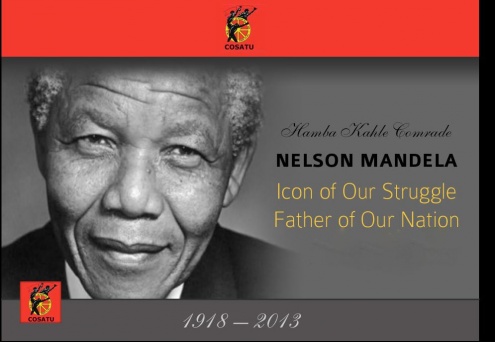 |
December 11, 2013: At the state memorial service for Nelson Mandela it seemed like even the heavens were in mourning. A grey sombre day, with a steady stream of wet tears from the sky blurring the cameras as one dignitary after another from around the world paid tribute to this great man. Never before has the loss of a leader been mourned the world over, and probably never again.
Nelson Rolihlahla Mandela, the greatest statesman that ever lived, is a world icon and yet he symbolised different things to different people. He is a symbol of triumph, where a village herd boy can grow up to challenge a repressive government and change the course of history. A symbol of struggle; organising for political change through the formation and leadership of structures of the African National Congress, including its military wing Umkhonto we Sizwe. A symbol of courage; having spent his early life enduring harassment and incarceration, yet even whilst in prison on a life sentence his name rallied people to fight for freedom. A symbol of reconciliation; when after spending 27 years in prison he delivered a nation out of an oppressive bloody regime on the power of forgiveness. A symbol of hope; using his powerful voice to speak out against injustice, human suffering, and to promote peace and wellbeing.
Mandela was not always universally respected. There was a time when the Tories in Britain publicly called for his hanging; he remained on the US terrorist watchlist until 2008; he was scorned for speaking out on the war in Iraq; for embracing Fidel Castro and acknowledging Cuba’s role in the struggle against apartheid; and for speaking out in defence of Palestine, saying that freedom in South Africa was incomplete without the freedom of the Palestinians.
A political giant, Mandela remained a man of the people. He acknowledged the role that organised labour palyed in ending apartheid, not only in South Africa but throughout the world. He understood that it was ordinary workers that stood up, stood together and stood in solidarity that created the masses to defeat apartheid.
Compromise for a new South Africa came at a price. Whilst Mandela believed in the rights of workers to prosper and lived dignified lives, the unstable macroeconomics left behind by apartheid required sacrificing the aspirations of the working class for economic stability. The newly democratic South Africa embraced neoliberalism and grounded its tenents in the economic framework adopted in 1996, the Growth, Employment and Redistribution policy, widely acknowledged to have entrenched inequality, unemployment and poverty that plagues South Africa today.
Yet he remains loved and honoured by the working class because he was a man of humility and principle. He acknowledged that the struggle of the working class was not over with the dawn of a new South Africa, and encouraged workers to hold the state accountable and fight for a more just South Africa.
The National Union of Mineworkers (NUM) bestowed on Mandela in 1980 the title of Lifetime Honorary President of the NUM. Today the NUM mourns “Mandela who has throughout sacrificed and dedicated his life for the good of the people of South Africa and the world will be solely missed as a global icon, a peace maker and a freedom fighter of note.” On his passing the NUM stated “he has been an inspiration through and through and has on many occasions motivated mineworkers to take education seriously as he believed that it is through it that their children will head mines.”
The National Union of Metalworkers of South Africa (Numsa) says “President Mandela will forever be admired and adored by the militant and fighting metalworkers of our country… President Mandela’s life touched many South Africans, young and old, black and white, because his life shone through our shared aspirations of a life of full human equality enshrined in the Freedom Charter. His outstanding contribution to our struggle for liberation, freedom, democracy and people’s power will be celebrated by many generations to come.”
Mandela’s death comes at a time when there is more than grief in the dark clouds that have gathered in the South African skies. There are divisions and disillusionment in many quarters, yet the country remains deeply democratic. Mandela’s legacy is the legacy of millions of South Africans that contributed to its making.
Numsa calls for renewed struggle to honour him; “The passing on of President Mandela marks the end of a political era in our journey towards full freedom. To truthfully and fully honour Mandela and his Comrades, President Mandela’s passing on must herald the birth of our renewal to intensify the struggle for full economic sovereignty, for complete economic freedom of the working class and the rural poor.”
The future is where we need to look to, says Frans Baleni, the NUM General Secretary; “As we dip our banners and celebrate the life and times of this stalwart, it is time that as South Africans we reflect on the legacy he left behind and the future we have to craft for generations to come”.
As IndustriALL pays tribute to this great man and joins the world in mourning his death, we give Mandela the final word. “I have walked that long road to freedom. I have tried not to falter; I have made missteps along the way. But I have discovered the secret that after climbing a great hill, one only finds that there are many more hills to climb. I have taken a moment here to rest, to steal a view of the glorious vista that surrounds me, to look back on the distance I have come. But I can rest only for a moment, for with freedom comes responsibilities, and I dare not linger, for my long walk has not ended.”
“Rest in peace our great struggle hero.”
December 12, 2013: On 10 December, Human Rights Day, national and global union organizations together with the Association for Human Rights in Central Asia and web resource LabourStart launched a campaign for release of seven oil workers held in custody since 2012.
After the struggle of oil workers started in 2011 with the Kazakh oil company KazMunaiGas (formerly Kazakhoil) when a labour dispute due to inactiveness of authorities bordering with complicity escalated into bloody riots at the end of 2011 in Zhanaozen resulting in 17 dead and many wounded, a real crackdown on oil workers rose serious concerns of the international union and human rights protection organizations.
The trial orchestrated by the Kazakh authorities in March 2012 sentenced 37 people to imprisonment or other punishment. Seven of them still remain in custody. Time and again national and international observers called the attention of the country’s leadership to numerous abuses of both the defendants and witnesses who testified the facts of being tortured.
One of the witnesses, Alexander Bozhenko, 20, testified in court that he was tortured for several days and forced to bear evidence against oil workers in Zhanaozen. After he publicly renounced from his previous testimony claiming he gave it through torture, the young man was severely beaten by some unidentified individuals and later died. The authorities declared his death was not related to the trial however serious doubts were raised around that.
Seven people, Tanatar Kaliev, Shabdal Utkilov, Talgat Saktaganov, Naryn Dzharilgasinov, Kanat Zhusipbaev, Maksat Dosmagambetov and Roza Tuletaeva are those remaining in custody up to now.
To send your message of protest to the president of Kazakhstan and to prevent further crackdown on workers’ rights and freedoms in Kazakhstan support the LabourStart campaign on the link http://www.labourstartcampaigns.net/show_campaign.cgi?c=2092
“Trade union rights are human rights. IndustriALL continues the global struggle to ensure that every worker has the right to freely join a trade union, get the protection of a collective agreement, as well as a safe and healthy workplace,” said Jyrki Raina, IndustriALL General Secretary.
December 12, 2013: On 4 December, Campo Elías Ortiz, a Colombian trade union, social and political activist as well as member of Unión Sindical Obrera (USO), was arrested. Merely a few hours later, two more members of USO, Jose Dilio Naranjo and Héctor Sánchez, were also detained. All three are employed by Pacific Rubiales, in the department of Meta.
The harassment, attacks, threats and detentions are part of a policy of persecution and interference with the work of USO, an IndustriALL Global Union affiliate, to promote trade union rights and freedoms for oil industry workers, especially those employed by Pacific Rubiales. The power of the oil companies in Colombia is strong. The companies’ private security groups, together with the armed forces, restrict the right of free trade union activity in the oil producing areas, prevent the free movement of trade union leaders, and deny them access to workers employed by these companies.
In November, IndustriALL Global Union wrote to the Colombian government denouncing the detention of the USO Meta vice president, Darío Cárdenas. Cárdenas was accused of obstruction of the public highway, damage to natural resources and aggravated damage to private property.
The court cases of the union leaders are proceeding, USO fears further detentions of its members and regional and national leaders and calls for urgent international and national solidarity to prevent the persecution and harassment of oil workers in Columbia and to send a strong message that the obstruction of trade union freedoms and penalization of union activity by companies like Pacific Rubiales will not be tolerated.
USO calls on other unions to denounce the anti-trade union regime fostered by the Colombian government on behalf of multinational companies, looting the country’s natural resources. The USO’s national executive denounces the detentions of union activists in the area of Rubiales, Meta, on the eastern plains.
Jyrki Raina, general secretary of IndustriALL Global Union, has written to President Santos urging him to intervene. IndustriALL demands the immediate release of Dario Cardenas, Campo Elias Ortiz, Jose Dilio Naranjo and Hector Sanchez; a guarantee of right to a fair trial; and a stop of the state persecution of oil workers and the country’s trade union and social movement.
Jyrki Raina says:
“We call on the government to repeal the Citizen Security Law and other arbitrary legislation that criminalizes the freedom of association and social protest, and that rides roughshod over workers’ rights.”
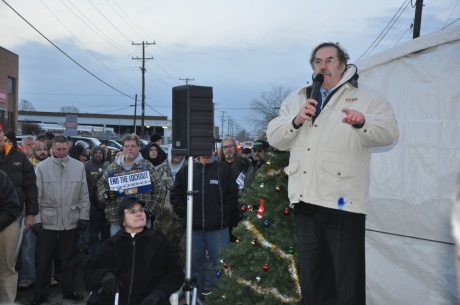 |
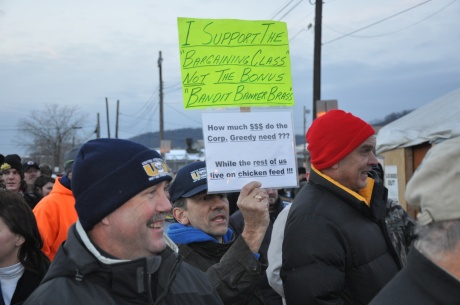 |
 |
December 12, 2013: USW Local 5032 rallied with their families and community supporters yesterday 11 December, denouncing the belligerence of employer Neville Chemical in locking out 105 workers and freezing their pensions.
The USW members have been locked-out by the company since 12 August 2013. The Neville Chemical Plant is on Neville Island, Pittsburgh, Pennsylvania, USA.
On 11 December around 250 people from all over the local region noisily assembled at the plant gate, together with USW president Leo Gerard. The message of the plant gate rally was to tell Neville Chemical to end the lockout and bargain fairly with its workers.
In an effort to reach a fair settlement, members of USW Local 5032 worked for more than eight months under the terms of their expired contract but in August, the company initiated a lockout by unilaterally freezing the workers’ pensions and imposing other cuts.
In recent rounds of contract negotiations, members of USW Local 5032 have agreed to significant concessions in order to keep the company profitable. Now the company is turning a profit and managers are still demanding that workers submit to further cuts.
Workers are standing up for their right to retire with dignity as the company demands a freeze to their pensions.
IndustriALL general secretary Jyrki Raina’s solidarity message to the 11 December mobilization read:
“We fully support the rally, which will bring together members of USW Local 5032, their families and the community of Pittsburgh at the gates of the Neville Chemical plant later today, to end the lockout and send a clear message to the company to bargain fairly with the workers.”
The members of USW Local 5032 have an average of 30 years of service at the facility. They see the lockout as a betrayal because, for years, they have sacrificed to make the company profitable, most recently agreeing to steep concessions in 2006 and 2008 to help the company survive.
See more information on the website of Fight Back Pittsburgh, the Pittsburgh Chapter of the USW Associate Member Programme. Fight Back Pittsburgh, has supported the struggle of Local 5032 and ensured sustained support from the local community.
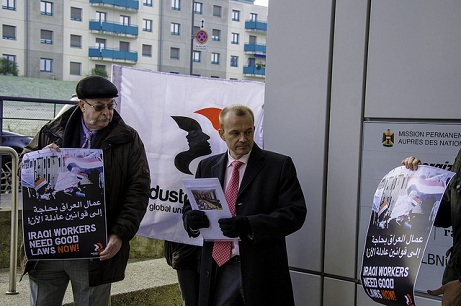 |
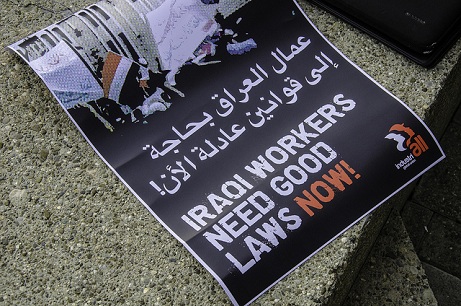 |
December 9, 2013: IndustriALL general secretary Jyrki Raina delivered this message to the Iraqi Ambassador to the UN in Geneva today. It is the latest stage of on-going dialogue with the Iraqi authorities to ensure an urgent passing of ILO-compliant labour and trade union legislation in the country.
In the meeting at the Iraqi Embassy this morning, 9 December, constructive discussions were conducted to support the legislative process of new labour and trade union laws to replace the Saddam Hussein era repression of workers’ rights to organise.
General secretary Jyrki Raina explained to Ambassador Mohammad Ismail that IndustriALL Executive Committee member Hashmeya Muhsin al-Saadawi and other affiliate leaders are unable to freely organise workers or exercise their basic rights while an ILO-compliant labour law remains pending.
While Iraq’s Constitution sets out protections of workers’ right to organise into a trade union of their choosing, the Saddam era laws 150 and 151 have removed that legal protection since 1987. The IndustriALL Iraqi National Council has campaigned together with their national centres and others in a unified effort to repeal the draconian laws.
See the report on November discussions on the labour law in Iraq which included the ITUC and the US Solidarity Center, as well as IndustriALL and ITF here.
A clear bottom line for the unions is that such a trade union law must apply to workers and employees throughout what is classified in Iraq as the public sector (over 80% of the economy) and it must also recognise the present day reality of trade union pluralism.
IndustriALL today also urged the importance of ending legal attacks such as the continual ones on Hassan Juma’a and other union leaders. Presently, although Hassan has again been acquitted the vice president of the Iraq Federation of Oil Unions (IFOU) appealed the fine levied against him that came to almost US$30,000 and succeeded in getting it dismissed only to have the Ministry appeal and ultimately succeed in re-imposing the draconian levy. He has now exhausted his administrative appeals and faces the possibility that the Ministry will demand a lump sum payment. Failure to pay could lead to loss of his job, seizure of his private property and even prison. Sixteen other workers face fines totaling more than US$600,000. Workers are being held personally responsible for the value of all lost production resulting from work stoppages. The Ambassador today denied that these charges were persecution for trade union activities but promised to investigate.
IndustriALL general secretary Jyrki Raina told the Ambassador:
“Iraq is described by many as the cradle of civilisation. It is time you took the high ground. Iraq could be a beacon of change in the Middle East & North Africa, and we would very much like to see that.”
Ambassador Ismail told IndustriALL:
“There is no doubt that Freedom of Association legislation will be enacted in Iraq. People in Iraq have the right to protect themselves. We are ready to cooperate with everybody. But there are many important decisions pending in the parliament. The process takes time, and the security situation is very serious.”
IndustriALL and its six Iraqi affiliates will continue to publicise the present appalling situation and press for ILO-compliant legislation to be passed in this parliamentary period in Iraq.